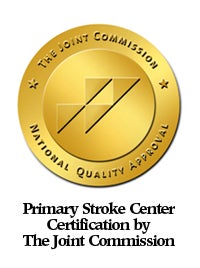
Leaders in stroke care in Pensacola
If you or a loved one is experiencing symptoms of a stroke — every second counts. Signs of a stroke include sudden loss of balance, lost or unclear vision, face drooping or uneven smile, arm weakness and difficulty speaking. Ascension Sacred Heart is Northwest Florida’s leader in stroke care. Our team includes board-certified neurologists and neurosurgeons, as well as endovascular neurosurgeon, Maria Toledo, MD, and interventional neuroradiologist, Nathan Kohler, MD. With specialists in stroke and transient ischemic attacks (TIA), we quickly work together to help improve blood flow, stop brain bleeds, and help prevent a future stroke.
Northwest Florida’s only certified Comprehensive Stroke Center
Getting the right care for stroke can be life-saving. The Ascension Sacred Heart Comprehensive Stroke Center is in the top 10 percent of stroke programs in the nation. And, we have a “Gold-Plus” rating by the American Heart Association and the American Stroke Association. This means we have the expertise and technology to care for the most complex stroke cases.
As the only hospital in Northwest Florida designated as a Comprehensive Stroke Center by the Florida Agency for Healthcare Administration and by DNV Healthcare, we are a regional leader in stroke care. Designations are awarded for excellence in the education, diagnosis, treatment, and rehabilitation of stroke.
The Comprehensive Stroke Center is directed by Terry Neill, MD, a board-certified critical care neurologist. The Stroke Center has endovascular neurosurgeons who can perform the latest minimally-invasive techniques used to diagnose and treat brain aneurysms, brain hemorrhages, and blockages that may cause ischemic strokes. We work together to provide advanced stroke care, when you need it the most.
Telehealth stroke care
- Are you over 65?
- Do you have a family history of stroke?
- Do you smoke?
- Have you had a prior stroke or heart attack?
- Do you have high blood pressure, diabetes, high cholesterol, heart disease, peripheral artery disease, AFib, heart valve disease or sickle cell anemia?
Neurologists at Ascension Sacred Heart deliver advanced stroke care throughout Northwest Florida. With our telehealth stroke program, we work with doctors at locations across the state. Our stroke specialists provide remote examinations, recommend diagnostic tests and discuss treatment decisions with you and your care team.
This service is available 24/7 and brings a high level of care to those in areas that may not have a staff neurologist on call. Rapid access to a neurologist can help save lives and minimize the physical damage caused by a stroke.
If you or a loved one are experiencing warning signs of a stroke — sudden loss of balance, lost or unclear vision, face drooping or uneven smile, arm weakness and speech difficulty — every second counts. Call 911 and go to the nearest ER.
Helping you manage stroke recovery and rehabilitation
Neurologists and care teams at Ascension Sacred Heart specialize in stroke care and recovery. We listen to understand you and your health concerns. Then, your doctors, nurses, physical therapists, occupational therapists and speech therapists work with you to create a care plan that's right for you. Our rehabilitation care team provides daily therapies and monitors your progress to help you meet your goals.
Your care doesn't stop when you leave the hospital. We can connect you to transitional care in your home, an outpatient stroke rehabilitation center or skilled nursing facility. Our goal is to improve your quality of life after a stroke.
Frequently asked questions about stroke
How do I know if I'm having a stroke?
Stroke symptoms can come on suddenly. Call 911 and go to the nearest ER if you experience any of the following symptoms:
- Sudden loss of balance
- Lost or unclear vision
- Face drooping or uneven smile
- Arm weakness
- Speech difficulty

What is a stroke?
A stroke occurs when there is a disruption in the blood supply to the brain. This disruption can come from a blocked blood vessel in the brain or a blood vessel that ruptures and bleeds into the brain. When you are experiencing a stroke — every second counts. Call 911 and go to the nearest ER.
What should I do if I think someone else is having a stroke?
If you think someone is having a stroke, ask them to repeat a sentence back to you, smile at you, and raise both arms. If they have trouble with any of these tasks, call 911 right away. Stay with the person and note the time they began to have symptoms. This information can help the emergency room care team.
How is stroke treated?
The sooner you get to the ER, the more options there may be for treatment. Medications and minimally invasive stroke interventions help prevent clots and dissolve blockages to restore blood flow to the brain. Endovascular procedures are used to repair or prevent a blood vessel from rupturing. Your doctors, nurses, and rehabilitation therapists help you recover after a stroke and help prevent a future stroke.

